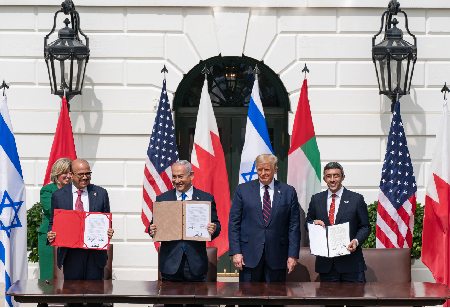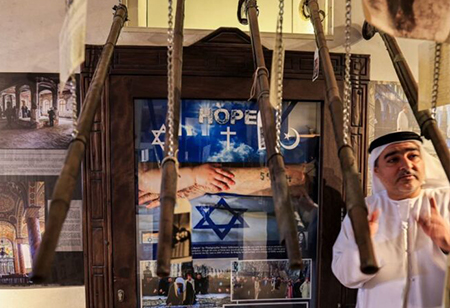
Blue Skies in West Asia: The Abraham Accord Starting to Bear Fruit?

 Last week, Israeli Prime Minister Benjamin Netanyahu met with Indian billionaire Gautam Adani and officially handed over the Haifa Port to the Adani Group. A consortium comprising Adani Ports, Special Economic Zone (APSEZ), and Israel’s Gadot Group is behind the acquisition of the strategic Israeli port for $1.18 billion. Adani Group holds a 70 percent stake in the consortium, while its Israeli partner Gadot owns 30 percent.
Last week, Israeli Prime Minister Benjamin Netanyahu met with Indian billionaire Gautam Adani and officially handed over the Haifa Port to the Adani Group. A consortium comprising Adani Ports, Special Economic Zone (APSEZ), and Israel’s Gadot Group is behind the acquisition of the strategic Israeli port for $1.18 billion. Adani Group holds a 70 percent stake in the consortium, while its Israeli partner Gadot owns 30 percent.
“Privileged to meet with Israeli PM Benjamin Netanyahu on this momentous day as the Port of Haifa is handed over to the Adani Group. The Abraham Accord will be a game changer for the Mediterranean Sea logistics. Adani Gadot set to transform Haifa Port into a landmark for all to admire” tweeted the Indian business tycoon. Adani Gadot’s investment manifests a great omen—Israel’s open arms toward foreign investment in the country. In truth, with Arabian countries almost welcoming Israel to the business fold, the business landscape in Western Asia is undergoing fundamental changes, which are happening quick & fast.
What Are the Abraham Accords?
It all started in the middle of the pandemic. The Abraham Accords are a series of joint normalization statements initially between Israel, the United Arab Emirates, and Bahrain, effective since September 15, 2020. Brokered by the US, the historic joint statement was announced after months of negotiation, and the leaders of both Middle Eastern nations formally signed the agreement on August 13, 2020. The first public normalization of relations between an Arab country and Israel since that of Jordan in 1994 is set to change the business dynamics in the middle east.
The name “Abraham” refers to the great father of the faith of the three Abrahamic religions: Judaism, Christianity, and Islam. The symbolic title effuses unity between Arabic and Jewish people, as it recognizes the shared patriarch.
The Abraham Accords Declaration
We, the undersigned, recognize the importance of maintaining and strengthening peace in the Middle East and around the world based on mutual understanding and coexistence, as well as respect for human dignity and freedom, including religious freedom.
We encourage efforts to promote interfaith and intercultural dialogue to advance a culture of peace among the three Abrahamic religions and all humanity.
We believe that the best way to address challenges is through cooperation and dialogue and that developing friendly relations among States advances the interests of lasting peace in the Middle East and around the world.
We seek tolerance and respect for every person in order to make this world a place where all can enjoy a life of dignity and hope, no matter their race, faith, or ethnicity.
We support science, art, medicine, and commerce to inspire humankind, maximize human potential and bring nations closer together.
We seek to end radicalization and conflict to provide all children a better future.
We pursue a vision of peace, security, and prosperity in the Middle East and around the world.
In this spirit, we warmly welcome and are encouraged by the progress already made in establishing diplomatic relations between Israel and its neighbors in the region under the principles of the Abraham Accords. We are encouraged by the ongoing efforts to consolidate and expand such friendly relations based on shared interests and a shared commitment to a better future.
Building on the Ties
We are already in the third year of the Abrahamic arranged marriage, and it is interesting to note the impacts of the diplomatic tie. Pleasing the anticipation, the normalization has opened up new avenues across defense and security cooperation, especially among Israel, Bahrain, and the UAE. The three countries sharing a common perspective on the security threat posed by Iran has definitely helped the cause. They have also been quite successful in building on the new diplomatic tie. The agreement to organize the Negev Forum, which also folded Egypt into the Abraham Accords coalition, is a case in point. The Negev Forum negotiated additional possibilities for cooperation on shared interests, including energy, food and water security, health, and other issues. Ultimately, Morocco has also recognized Israel. It’s a great stride forward. However, it hasn’t been all roses; there have been thorns too. The radicals in the region continue to oppose diplomatic ties with Israel. But the new developments in relationships between the Arab and Jewish governments are set to add salt to the wounds of radicals. It is not only that there are reports of Affinity Partners, a new private-equity fund started by Jared Kushner, planning to invest money from Saudi Arabia’s sovereign wealth fund in Israeli businesses, but the emirates also announced that it would teach about the Holocaust in history classes in primary and secondary schools across the country.
 ‘Holocaust’ is an umbrella term for how Nazi Germany systematically killed six million European Jews during World War II. Israel, founded in 1948 as a haven for Jews in the wake of the Holocaust, grants automatic citizenship to anyone of Jewish descent.
‘Holocaust’ is an umbrella term for how Nazi Germany systematically killed six million European Jews during World War II. Israel, founded in 1948 as a haven for Jews in the wake of the Holocaust, grants automatic citizenship to anyone of Jewish descent.
According to the United Arab Emirates embassy in the US, the emirates will begin teaching about the Holocaust in history classes in primary and secondary schools across the country. “In the wake of the historic Abraham Accords, (the UAE) will now include the Holocaust in the primary and secondary schools curriculum,” the embassy said in a tweet.
Last week, the UAE unveiled a private museum, even displaying a Torah scroll that survived the Holocaust. The scroll is on permanent loan to the museum from the Memorial Scrolls Trust, which looks after over 1,000 Czech scrolls saved from the Holocaust and later sent to London. Ahmed Obaid Al Mansoori, founder of the Crossroads of Civilizations Museum in Dubai’s historic district, says, “The display, unveiled for International Holocaust Remembrance Day, would help combat the ‘big denial’ of the Holocaust in the region. For us, peace is complete peace. Many people have forgotten the Jews are part of the region. So here, we’re trying to show the good days between the Jews and the Arabs in the past.” The thunderstorms in Western Asia are giving way to clearer skies, peace, and harmony in the region. It’s magical.

